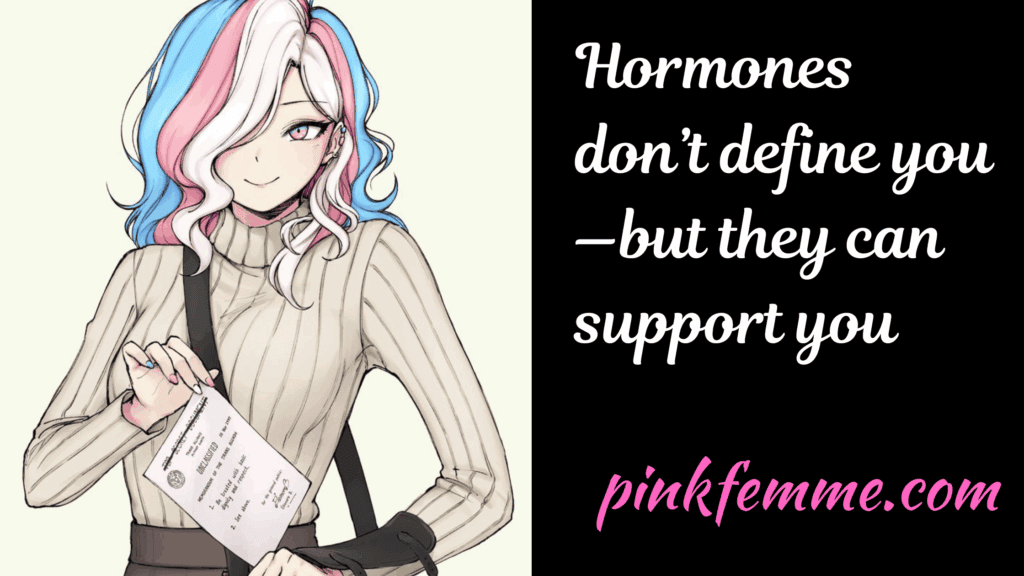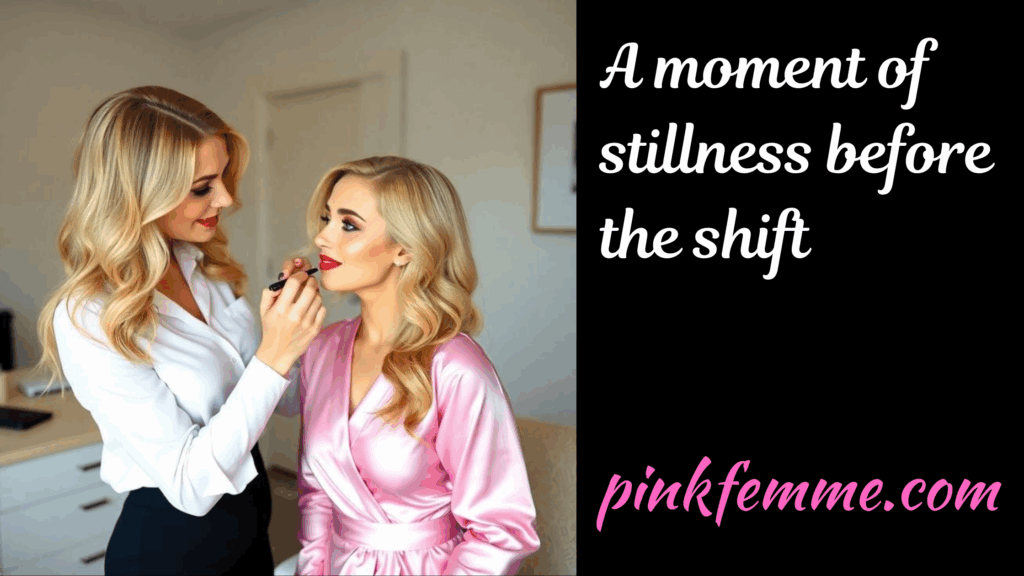
If you’re here asking this question, I just want to start by saying: I see you. The journey to figuring out whether you’re ready to begin hormone therapy is deeply personal and, for many, emotionally layered. Maybe you’re feeling unsure, maybe you’re overwhelmed, or maybe you just need someone to say, “It’s okay to take your time.” This article is for adults who are exploring whether medical transition is the right step for them. No judgment—just guidance, empathy, and honesty from someone who’s been in this space for a long time.
You might be ready to start hormones if you’ve identified clear goals, feel distress from dysphoria, or have a desire to align your body with your gender identity—but readiness also includes emotional clarity, safety, and support.
Hormone therapy can be life-affirming—but it’s not a one-size-fits-all decision. Whether you’re experiencing gender dysphoria or simply want to feel more aligned with your identity, there are questions worth exploring before you move forward. Let’s talk through them together so you can step into your truth with greater confidence and clarity.
Why This Question Matters
So many people reach out to me asking, “How do I know if I’m ready for hormones?” And every time, I feel the weight behind that question. It’s not just about medication—it’s about self-understanding, safety, timing, and emotional readiness. For most, it’s about stepping into a deeply personal journey of becoming more fully themselves, and that deserves to be held with care, not rushed or judged.
When someone brings this question to me, I don’t hear indecision—I hear self-awareness. I hear someone being thoughtful about their well-being, their future, and their truth. That’s something I deeply respect. There’s no universal roadmap for gender transition, and certainly no single moment when the clouds part and clarity arrives with a trumpet sound. For many, readiness unfolds slowly, like a sunrise—first a flicker, then a glow, and eventually full daylight.
Hormones can be incredibly affirming. They can help soothe the distress of gender dysphoria, create a greater sense of congruence between your body and your inner sense of self, and for many, they’re a vital part of transitioning. But that doesn’t mean everyone arrives at the decision in the same way. Some people have a clear internal “yes” that’s been simmering for years. Others feel unsure, even if the longing is there. And that’s okay.
What matters most isn’t achieving perfect certainty—because let’s be honest, perfection doesn’t really exist when we’re talking about human experiences. What matters is that you’re asking the right questions: about your desires, your goals, your safety, and your capacity for change. What matters is understanding what hormones can (and can’t) do for you and what you hope to gain from the experience.
This question matters because you matter—your health, your identity, your peace of mind, your joy. And giving yourself permission to explore these questions with honesty and compassion is one of the most loving things you can do for yourself.
Understanding Your “Why”
One of the most grounding things you can do when you’re thinking about starting hormones is pause and gently ask yourself, Why do I want this? That simple question can open the door to a deeper level of self-awareness—and it’s okay if the answer doesn’t come right away or if it shifts over time.
Take a moment to explore what you’re hoping hormones might bring into your life. Are you seeking relief from the emotional weight of dysphoria? Do you long to see your reflection align more closely with how you feel inside? Are you hoping to step into your gender identity with a fuller sense of embodiment and ease? These are all deeply valid reasons—and they often come from a place of longing to live more freely and authentically.
But I want to gently offer this, too: your “why” doesn’t have to be rooted in pain to be valid. You don’t need to be suffering in order to want change. There are plenty of people who don’t experience constant dysphoria yet still feel drawn to hormones because they know, intuitively, that it will help them feel more at home in their skin. That quiet pull toward alignment—toward truth—is just as real and just as worthy of being honored.
That said, it’s important to be mindful if you find yourself looking to hormones to “figure out” your gender identity. I say this not to discourage you, but to help you avoid additional confusion. Hormones can bring powerful emotional shifts. They can lift you up, but they can also amplify uncertainty if you’re still very unclear about who you are or what you want. For some, those changes are illuminating. For others, they can muddy the waters.
Think of hormones as a way to affirm and support the identity you’ve already begun to understand—not as a diagnostic tool. They’re not meant to tell you who you are; rather, they can help strengthen the connection to the person you already know yourself to be, even if that knowing is still taking shape.
Getting in touch with your “why” can help ground you when doubts arise—which they probably will, and that’s normal. When your path gets foggy, being able to come back to your original intention can feel like holding your own hand. And you deserve that kind of care and clarity.
Do You Have a Clear Pain Point?
For many people, the path to hormones begins with a deep, often aching sense of disconnection—a quiet (or sometimes loud) distress that whispers, this body doesn’t feel like home. That discomfort, commonly known as gender dysphoria, can manifest in many forms: emotional pain, body-related distress, anxiety around being perceived in a way that feels untrue, or even just a constant, low-level sense of “wrongness” that’s hard to name but impossible to ignore. When this kind of pain is present, hormones can feel like a life raft—something that offers not just relief, but a chance to breathe again.
And yet… not everyone arrives at this decision through pain. That’s something we don’t talk about often enough. If you don’t experience intense dysphoria, or if you’ve only felt it in certain areas or moments of your life, it doesn’t make your journey less real. It simply means your path may be shaped more by a pull toward alignment and authenticity than by an urgency to escape discomfort. That’s still a powerful reason to consider hormones.

Some people don’t feel tormented by their physical traits—they just have a quiet knowing that something else would feel more right. A desire for softness. A craving for strength. A longing to feel seen in a way that mirrors their inner truth. And sometimes, it’s less about changing something that hurts and more about claiming something that heals.
If you’re not experiencing a clear pain point, that doesn’t mean you’re not ready. It just means the questions guiding your process might need to be different—more focused on growth, on intention, on vision. Try asking yourself:
- What am I hoping hormones will change in my life—not just in my body, but in my sense of self, my relationships, my emotional well-being?
- How do I feel about the gender I was assigned at birth? Do I feel neutral about it, resistant, disconnected, or something else entirely?
- Is there something I feel called to move toward—not just something I want to move away from?
These kinds of questions help you understand your motivation on a deeper level. They aren’t about proving your identity to anyone—not even yourself—but about creating clarity, intention, and self-trust. Because whether your decision is anchored in easing pain or embracing joy, the heart of the matter is the same: you deserve to feel at home in yourself.
Are You Emotionally and Practically Ready?
Sometimes the real question isn’t “Am I ready for hormones?” but “Is the rest of my life ready to hold this change with me?”
You might already feel that quiet (or loud) yes deep inside—that inner knowing that hormones are the next right step for you. But readiness doesn’t live in a vacuum. You can feel certain in your heart while still needing time to prepare your world around you. And that’s not hesitation—it’s wisdom.
Maybe you’re still working up the courage to come out to a partner or a family member whose support means a lot to you. That can feel like a mountain, especially when you’re not sure how they’ll respond—or if it’s even safe to share with them yet. Or perhaps you’re waiting until you can move into a living situation where you feel physically and emotionally secure enough to start this journey with peace of mind.
Some people are also navigating the long, frustrating path of finding affirming providers. That can include a knowledgeable doctor, a therapist who gets you, or a clinic that offers informed consent without unnecessary barriers. Building that team might take time—and that’s okay.
And support systems? They matter more than most people realize. Whether it’s friends, community groups, online spaces, or just one trusted person, having someone who can hold space for your fears, your wins, your changes—it can make all the difference.
None of this makes you “less ready.” In fact, it shows that you’re honoring yourself. You’re not just rushing toward change—you’re preparing for it with care. That thoughtful approach is not only valid—it’s powerful. You’re protecting your peace, tending to your safety, and giving yourself the strongest foundation possible. That’s something to be proud of.
So if your heart says yes but your life still needs to catch up a bit, give yourself grace. Readiness isn’t always a straight line. It’s often a dance between desire, timing, and real-world logistics. And every step you take—no matter how small—is still movement toward becoming more fully, beautifully you.
Don’t Wait for Perfect Certainty
Let’s take a deep breath together, because I want to tell you something important: you don’t need to feel 100% certain to move forward.
I know how easy it is to believe that “real” readiness means feeling completely sure, completely clear, and completely fearless. But that kind of perfection is a myth. Even people who have known deep down for years that they want to transition—who’ve lived with gender dysphoria for most of their lives—still find themselves second-guessing their choices. They still get those moments of “What if I’m wrong?” or “Am I really ready?”
That kind of wavering doesn’t mean you’re not ready. It means you’re human.
Our minds are brilliant at playing both sides. You might find yourself acting as your own defense attorney one moment—passionately defending your desire to transition—and then five minutes later, you’re the prosecutor, questioning everything you just said. This inner back-and-forth can be exhausting and confusing, and when dysphoria is inconsistent or comes in waves, it only adds to the doubt. One day it’s intense, and the next, you feel almost okay. That kind of fluctuation can make you question if it was ever real to begin with.
But here’s the truth: readiness isn’t about never having doubts. It’s about learning to hold space for them without letting them derail you.
The real sign of readiness is curiosity. It’s the willingness to sit with your questions honestly and lovingly—not to silence them, but to understand what they’re trying to tell you. It’s getting informed about what hormones can and can’t do. It’s allowing yourself to imagine the life you want—and then gently exploring whether hormones are a meaningful step toward that life.
If you can answer the following questions with even some clarity, you’re probably more ready than you realize:
- What are my goals for starting hormones?
(Is it emotional relief, physical congruence, or a deeper sense of alignment with who I know myself to be?) - What changes am I prepared for—physically and emotionally?
(Have I educated myself on what to expect, and do I feel emotionally supported as I consider those shifts?) - How will hormones support my well-being and identity?
(Do I have a sense that this step will help me feel more grounded, seen, and whole?)
You don’t need a loud, bold, unwavering yes. A quiet, thoughtful maybe this is right for me can be just as valid.
So let go of the pressure to feel perfectly sure. Instead, let yourself lean into understanding, reflection, and self-compassion. The clarity you’re seeking isn’t found in certainty—it’s found in connection. With your truth. With your needs. With your heart.
And wherever you are in that process, you are doing beautifully. You’re not behind. You’re not broken. You’re simply becoming.
What Hormones Can and Can’t Do
Hormones can be life-changing. There’s no other way to say it—they can bring a sense of ease and alignment that feels like finally exhaling after holding your breath for too long. For many people, they soften the edges of gender dysphoria, bring the body into closer harmony with the heart, and create a profound shift in how you experience yourself day to day.
They can:
- Ease the emotional weight of dysphoria by helping your body begin to reflect your internal sense of self.
- Shift physical features in ways that feel more affirming, such as fat distribution, skin texture, voice, or muscle development, depending on the type of hormones.
- Support your mental and emotional well-being—some people describe a kind of emotional “settling,” a newfound peace, or even a sense of homecoming.
- Strengthen your identity by validating and reinforcing what you already know to be true about yourself.
But while hormones can be deeply affirming, they aren’t a magic wand.
They don’t instantly erase internal confusion or settle all your identity questions. They’re not a shortcut to self-discovery or a cure-all for pain. If you’re still in a tender place—still wondering exactly where you land on the gender spectrum—hormones might bring clarity over time. But they might also introduce new feelings, sensations, or experiences that require emotional readiness and gentle processing.
For example, changes brought on by hormones can stir unexpected emotions, shift how others perceive you, or even affect how you relate to your body and sense of gender. That’s not a bad thing, but it does mean it helps to enter this chapter feeling as grounded as you can be, with tools for self-reflection and support close by.
Also, hormones don’t fix the things that need care in other parts of your life. If you’re dealing with trauma, depression, or lack of support, hormones might help—but they won’t resolve everything on their own. They’re just one piece of your larger healing journey, and it’s okay to acknowledge that.
So if you’re still figuring things out, be gentle with yourself. You don’t need to have all the answers right now. You might find that hormones are part of your path—or not. What matters most is moving forward with care, curiosity, and kindness toward your own process.

You deserve to make these choices from a place of love, not pressure. And no matter what you decide, your gender is valid, your experience is real, and your path is worthy.
Final Thoughts: From Doubt to Clarity
You might be hoping for a moment of lightning-bolt clarity—a sign, a surge of certainty, a voice inside you saying, Yes, now is the time. And sometimes that moment does come. But often? Readiness feels quieter. Softer. Less like a sudden answer and more like a slow unfolding.
It’s okay if you still carry doubts. Doubt doesn’t mean you’re not trans or nonbinary enough. It doesn’t mean you’re doing it wrong. In fact, it often means you care deeply about making the right decision for you—one rooted in reflection rather than reaction. That’s something to honor, not fear.
What truly matters is your “why.” Can you name what you’re hoping hormones will bring into your life—more ease, more embodiment, more joy? Are you aware of the changes ahead, and how they might feel—not just physically, but emotionally, relationally, and even spiritually? If so, you may already be further along than you think.
Hormones can be an affirming and powerful part of your gender journey, but they’re not the destination. They’re a tool—one of many—that you can choose to use as you build a life that feels aligned, integrated, and yours.
So give yourself space. Sit with your questions. Revisit them as often as you need. You don’t have to rush this. You don’t have to prove anything to anyone—not even to yourself. Readiness isn’t a door you walk through once. It’s a path you return to again and again, checking in, recalibrating, growing braver with each step.
You deserve support, softness, and space to do this your way. No matter where you are in the process, your truth is valid, and your path is sacred.
You’ve got time. And you’re not alone.
I’d Love to Hear from You
If you’ve stepped into hormones, what helped you know you were ready? Was it dysphoria? A sense of clarity? Or something else entirely? Drop a comment and share your story. And if this article spoke to you, please pass it along to someone else who might be asking the same questions.
Until next time—be gentle with yourself.
If you are looking for more lifestyle-related posts here on Pink Femme, you can find them all here.
If you enjoy reading transgender coming out stories or romance stories with a trans-positive element, take a look at my author page on Amazon where you will find all the novels that I have published so far.
Keep up to date with all my latest femme news with the fabulous Pink Femme Newsletter. Each Monday you’ll receive an email from me that will include a chapter from the novel that I am currently writing. I will also alert you to interesting information from articles that have not yet been published on Pink Femme. The Pink Femme Newsletter is the only place to see chapters from the novels before they are published. Sign up today: PINK FEMME NEWSLETTER.
Thank you for your visit to the Pink Femme website. I’m determined to keep all of the valuable information on here free for anyone to access. No pay-walls. That said, if you are able to help keep the lights on, so to speak, I would really appreciate your support. Here is the Pink Femme Patreon page with a really cheap support tier. Every little bit helps to cover the costs of keeping Pink Femme alive on the internet. Hugs to all of you.
When it comes to my choices for makeup and beauty products, I only use L’Oréal Paris (Available on Amazon). I have really sensitive skin and never once have I had any negative reaction to any L’Oréal product.
References
- American Psychological Association. (2015). Guidelines for Psychological Practice with Transgender and Gender Nonconforming People. https://www.apa.org/practice/guidelines/transgender.pdf
- Coleman, E., Radix, A. E., Bouman, W. P., Brown, G. R., de Vries, A. L. C., Deutsch, M. B., … & Zucker, K. (2022). Standards of Care for the Health of Transgender and Gender Diverse People, Version 8. International Journal of Transgender Health, 23(Suppl 1), S1–S259. https://doi.org/10.1080/26895269.2022.2100644
- Lev, A. I. (2004). Transgender Emergence: Therapeutic Guidelines for Working with Gender-Variant People and Their Families. Routledge.
- Murad, M. H., Elamin, M. B., Garcia, M. Z., Mullan, R. J., Murad, A., Erwin, P. J., & Montori, V. M. (2010). Hormonal therapy and sex reassignment: A systematic review and meta-analysis of quality of life and psychosocial outcomes. Clinical Endocrinology, 72(2), 214–231. https://doi.org/10.1111/j.1365-2265.2009.03625.x
- Keo-Meier, C. L., & Ehrensaft, D. (Eds.). (2018). The Gender Affirmative Model: An Interdisciplinary Approach to Supporting Transgender and Gender Expansive Children. American Psychological Association. https://doi.org/10.1037/0000095-000
- de Vries, A. L. C., McGuire, J. K., Steensma, T. D., Wagenaar, E. C. F., Doreleijers, T. A. H., & Cohen-Kettenis, P. T. (2014). Young adult psychological outcome after puberty suppression and gender reassignment. Pediatrics, 134(4), 696–704. https://doi.org/10.1542/peds.2013-2958
- Budge, S. L., Adelson, J. L., & Howard, K. A. S. (2013). Anxiety and depression in transgender individuals: The roles of transition status, loss, social support, and coping. Journal of Consulting and Clinical Psychology, 81(3), 545–557. https://doi.org/10.1037/a0031774
- White Hughto, J. M., Reisner, S. L., & Pachankis, J. E. (2015). Transgender stigma and health: A critical review of stigma determinants, mechanisms, and interventions. Social Science & Medicine, 147, 222–231. https://doi.org/10.1016/j.socscimed.2015.11.010
- Puckett, J. A., Cleary, P., Rossman, K., Mustanski, B., & Newcomb, M. E. (2018). Barriers to gender-affirming care for transgender and gender nonconforming individuals. Sexuality Research and Social Policy, 15(1), 48–59. https://doi.org/10.1007/s13178-017-0295-8
- American Psychological Association. (2023). Ethical Principles of Psychologists and Code of Conduct. https://www.apa.org/ethics/code
